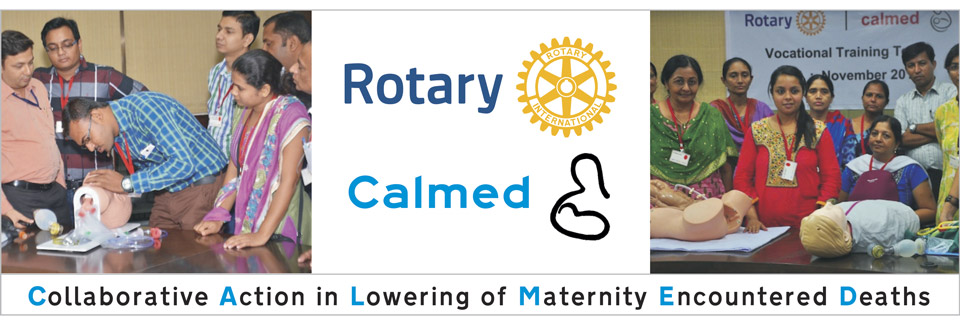
About the ‘CALMED’ Programme
Rotary International has now made a number of Global Grants Programme to facilitate ‘CALMED’ training missions to tribal states in India where the maternal death rate is highest – Sikkim (2013-17), Bhuj (2014-18) and soon Meghalaya (2019-2022).
The First Vocational Training Team (VTT) visited Sikkim State in 2013 (target population of 0.7 million) to test the ‘Calmed’ approach to training members of the medical and allied professions, including Public Health Workers. A team of 6 UK Obstetricians and Gynaecologists visited the State for a two-week period to pass on skills and “best practice guide” from the UK.
The intention was to teach their opposite numbers in these high-risk States to become ‘Master Trainers’ who could then go on to cascade their knowledge, skills, behaviour and enthusiasm to others in the same field in Sikkim. Over time the intention is for the Master Trainers to build up continually the numbers of doctors/midwives trained in these new skills so that a real impact can be made on both the skills and culture of medical treatment for mother’s babies requiring emergency care around childbirth
At the same time, attention is given to the mothers themselves who need to know more about their own pregnancy and treatment, particularly in the thousands of remote villages where proper medical care is distant. In India, there exists a network of public health workers ASHAs (Accredited Social Health Activists) who go to each of these villages to teach mothers the knowledge and awareness they will need for successful childbirth. It makes good sense to target ASHAs for similar best practice training. Two further visits occurred in 2016 and 2017.
The 2nd VTT / Calmed expedition went to Bhuj in Gujarat state in November 2014(target population of 2.5 Million)The same methodology was repeated to the local medical profession and ASHAS, again leaving behind a cascade training model to grow through the new local Master Trainers. Two further visits took place in 2016 and 2018.
Our next planned VTT / CALMED visit (in March 2020 ) is to visit another needy part of India with a high maternal mortality rate – the state of Meghalaya (population 3.5 million). We will be basing our training team at Shillong, a major city of some 150,000 people, but surrounded by many remote rural villages. Here the death rate for mothers is high even by Indian standards, and implementation of the CALMED approach to improving childbirth care in emergencies will make a real impact on the problems.
Our teams attack ‘the three delays’ which together cause countless unnecessary deaths to mothers and babies, which can be substantially reduced through some simple and often low tech solutions. The Three Delays:
- Delay in Recognising Emergency Problems– Mothers in Remote Rural villages not recognising problems in their pregnancy/childbirth and seeking immediate help
- Delay in Reaching Medical Institutions– When problems occur, delays in getting the mother /baby to the hospital or medical treatment, often long journeys away with poor or non-existent transport links
- Delay in Receiving Treatment at the Institutions– On arrival at the hospital, delay in recognising the danger symptoms and urgently getting the mother access to appropriately skilled and trained medical assistance, often due to lack of staff capable of dealing promptly with emergencies.
We will be dealing with the education of the doctors and medical staff at the hospitals, education on the need for rapid emergency transport to those hospitals, and right at the start, the education of the mothers and their families in the rural villages to recognize the deadly hazards that can so easily be avoided with a little knowledge and training.
Again, we will use the successful formula of 7 UK Gynaecologists / Obstetricians who will teach the prospective Master Trainers their skills over four days. They will then oversee the Master Trainers conducting their first course to their medical peers for a further four days, and then they will separately train the ASHA Trainers in the aspects of Calmed which most meet the immediate information needs of mothers in the remote districts. In Meghalaya, we hope to begin reducing the UK input by using 2 of our previous locally trained Master Trainers to join our initial VTT faculty.
See ‘About Calmed’ on our Papers & Resources page for more information on the Calmed rationale and these exciting projects.
